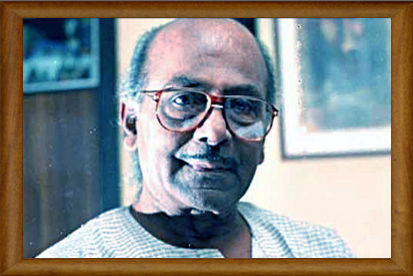
SALIL CHOWDHURY
Popular As: Salil Da
Birth: 19th November 1925
Death: 5th September 1995
1st Film: Do Beegha Zameen
Last Film: Swami Vivekanand
Work Span: 1950 - 1995

Popular As: Salil Da
Birth: 19th November 1925
Death: 5th September 1995
1st Film: Do Beegha Zameen
Last Film: Swami Vivekanand
Work Span: 1950 - 1995
| Sr. | FILM TITLE | YEAR OF RELEASE | Sr. | FILM TITLE | YEAR OF RELEASE |
|---|---|---|---|---|---|
| 1 | Do Beegha Zameen | 1953 | 36 | Gehra Raaz | 1971 |
| 2 | Biraj Bahu | 1954 | 37 | Mere Apne | 1971 |
| 3 | Amaanat | 1955 | 38 | Annadata | 1972 |
| 4 | Naukari | 1955 | 39 | Anokha Daan | 1972 |
| 5 | Taangewali | 1955 | 40 | Anokha Milan | 1972 |
| 6 | Aawaz | 1956 | 41 | Mere Bhaiya | 1972 |
| 7 | Jaagte Raho | 1956 | 42 | Sabse Bada Sukh | 1972 |
| 8 | Parivaar | 1956 | 43 | Rajni Gandha | 1974 |
| 9 | Ek Gaon Ki Kahani | 1957 | 44 | Sangat | 1975 |
| 10 | Laal Batti | 1957 | 45 | Jivan Jyoti | 1976 |
| 11 | Musafir | 1957 | 46 | Mrigya | 1976 |
| 12 | Zamaana | 1957 | 47 | Udanchhoo | 1976 |
| 13 | Apradhi Kaun | 1958 | 48 | Minoo | 1977 |
| 14 | Madhumati | 1958 | 49 | Anand Mahal | 1977 |
| 15 | Honey Moon | 1960 | 50 | Room No. 203 | 1980 |
| 16 | Jawahar | 1960 | 51 | Chemmeen Lahren | 1980 |
| 17 | Kaanoon | 1960 | 52 | Daisy | 1980 |
| 18 | Parakh | 1960 | 53 | Kuhasa | 1980 |
| 19 | Usne Kaha Tha | 1960 | 54 | Chirutha | 1981 |
| 20 | Chaar Diwaari | 1961 | 55 | Jeena Yahan | 1981 |
| 21 | Chhaya | 1961 | 56 | Nani Maa | 1981 |
| 22 | Kabuli Wala | 1961 | 57 | Plot No. 5 | 1981 |
| 23 | Maaya | 1961 | 58 | Agni Pareeksha | 1982 |
| 24 | Mem Didi | 1961 | 59 | Dil Ka Saathi Dil | 1982 |
| 25 | Sapne Suhaane | 1961 | 60 | Kanoon Kya Karega | 1984 |
| 26 | Half Ticket | 1962 | 61 | Trishangini | 1989 |
| 27 | Jhoola | 1962 | 62 | Aakhiri Badla | 1990 |
| 28 | Prem Patra | 1962 | 63 | Triyaatri | 1990 |
| 29 | Chaand Aur Sooraj | 1965 | 64 | Jawahar | 1991 |
| 30 | Poonam Ki Raat | 1965 | 65 | Swami Vivekanand | 1994 |
| 31 | Netaji Subhash Chandra Bose | 1966 | 66 | Mera Daamad | 1995 |
| 32 | Pinjre Ke Panchhi | 1966 | 67 | Maange Mile Na Pyar | 198? |
| 33 | Ittefaq | 1969 | 68 | Mitti Ka Dev | 197? |
| 34 | Saara Aakash | 1969 | 69 | Hamari Shadi | 198? |
| 35 | Anand | 1970 | 70 | Raat Ki Uljhan | 197? |